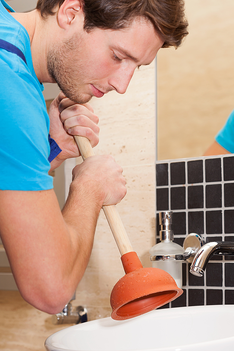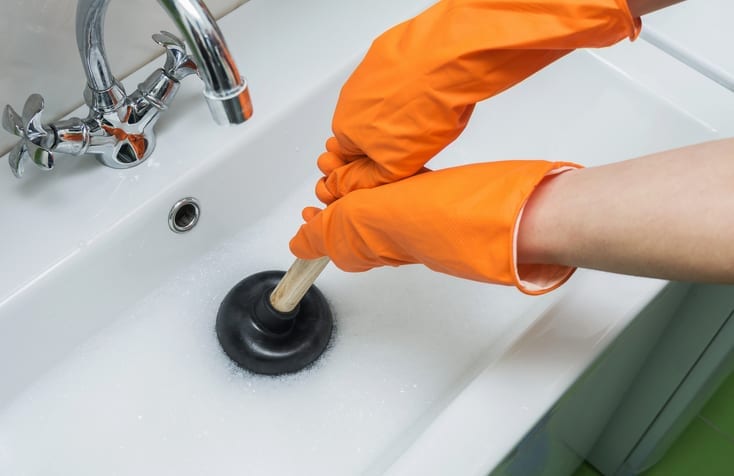How do you actually feel with regards to How to Unclog Your Sink with a Plunger?

Introduction
Proper upkeep of household drains pipes is vital for protecting against blockages and guaranteeing smooth water circulation. Among the secret tools in every home owner's toolkit is the plunger, alongside various drain cleansers created to deal with stubborn blockages efficiently. This short article checks out how to utilize bettors and drain cleaners successfully to maintain your drains pipes streaming openly.
Area 1: Understanding Plungers
Types of Plungers
There are numerous sorts of plungers offered, each developed for different types of drains pipes and blocks. One of the most usual kinds include mug plungers, flange bettors, and accordion plungers.
How Plungers Job
Plungers work on the concept of creating pressure and suction to displace blockages. When properly applied over a drain, they create a vacuum that can take out debris or separate clogs.
Picking the Right Bettor
Picking the right plunger relies on the sort of drain and the nature of the clog. Cup plungers are ideal for sinks and tubs, while flange plungers are better matched for toilets as a result of their layout.
Typical Mistakes with Bettors
Preventing these mistakes ensures efficient plunging: improper seal around the drain, not enough force, and unclear surrounding debris.
Area 2: Using Plungers Properly
Prep work
Before plunging, make certain the plunger covers the drain entirely and develops a limited seal. Clear any type of noticeable debris around the drainpipe opening.
Method
Beginning with gentle diving movements to build suction. Boost stress slowly, making use of a stable rhythm. Repeat as essential until the drain gets rid of.
Troubleshooting Tips
If diving doesn't work, try readjusting the seal, applying petroleum jelly for a better seal, or utilizing a different kind of bettor.
Area 3: Recognizing Drainpipe Cleaning Company
Sorts Of Drain Cleansers
Drain pipes cleaners can be chemical or enzymatic. Chemical cleansers make use of solid chemicals to liquify clogs, while enzymatic cleansers make use of natural enzymes to break down raw material.
Just How Drain Cleansers Job
Chemical cleansers respond with obstructions to liquify them, while enzymatic cleaners break down organic products like hair and oil without damaging pipelines.
Safety and security Factors to consider
Constantly put on handwear covers and eye defense when utilizing chemical drain cleaners. Guarantee sufficient ventilation and follow maker guidelines thoroughly.
Eco-Friendly Alternatives
Think about making use of vinegar and cooking soft drink or enzyme-based cleansers for environment-friendly choices that are more secure for pipelines and the setting.
Area 4: Utilizing Drainpipe Cleansers Efficiently
Application Methods
Put chemical cleaners directly right into the drainpipe opening. Allow them to help the advised time prior to flushing with hot water. Enzymatic cleansers need to sit overnight.
Safety measures
Prevent blending various sorts of cleansers, as this can produce toxic fumes. Never ever make use of chemical cleaners together with a bettor, as splashing can occur.
Dealing With Stubborn Blockages
For persistent obstructions, consider using a plumbing serpent or calling a professional plumber to prevent damage to pipelines.
Verdict
To conclude, comprehending exactly how to use bettors and drainpipe cleaners effectively is essential for keeping healthy and balanced plumbing systems. By picking the right devices and techniques, home owners can deal with small blockages and prevent significant plumbing concerns down the line.
How To Properly Use A Plumbing Snake To Clear Drains
When any drain clogs in our home arise, we tend to gravitate toward the plunger and little else. In cases where the plunger and its vacuum-created pressure are not able to clear clogs, many immediately move to harmful chemicals or simply call their plumber to fix the issue.
we’re happy to help with all drain cleaning needs and concerns. This includes informing you on a few other home remedies you may have at your disposal for minor to moderate clogs, one of which is the use of a plumbing snake. Many people have never used one of these before – let’s go over the steps to take when your drain clogs and you have a plumbing snake available.
Attempt Plunger Use
The first step here, as we noted above, should indeed be to grab your plunger when you notice a drain clog and attempt to resolve it this way. If you’re unsure how to use a particular type of plunger, our plumbers can answer any questions you have. If this doesn’t do the trick, however, you move on to the snake.
Locate And Prepare Snake
A plumbing snake is a metal or plastic device that’s generally about a quarter of an inch thick. It’s design with significant extensions, meant to reach down into your clogged drain and push the clog out. Snakes also contain drain augers that will latch onto and push stubborn blockages.
If your plunger doesn’t clear a clog, locate your snake and bring it to the drain in question. We also recommend keeping a bucket nearby to collect the clog once you pull it out, plus we’d advise wearing goggles and possibly protective gloves.
Feed Snake
Once you’re ready to go, feed the snake slowly down the drain, using the crank device it comes with to keep it moving until it finds the clog. Once this happens, much of the clog will be latched onto the coil so you can pull it out, while the rest will simply break up and flow downward.
Detach Debris
Remove the snake slowly from the drain, and once you’ve done so, pick off any debris that’s stuck to the coil. This is another area where wearing gloves is a must.
Flush Drain
Finally, take a few minutes to ensure the snake has done its job correctly. If you’ve been using it on a toilet, flush the toilet a couple times and make sure everything flows well. If you’ve used it on a different drain, flush it with some room temperature water.
https://www.mybuddytheplumber.com/blog/how-to-properly-use-a-plumbing-snake-to-clear-drains/

Application Methods
Put chemical cleaners directly right into the drainpipe opening. Allow them to help the advised time prior to flushing with hot water. Enzymatic cleansers need to sit overnight.
Safety measures
Prevent blending various sorts of cleansers, as this can produce toxic fumes. Never ever make use of chemical cleaners together with a bettor, as splashing can occur.
Dealing With Stubborn Blockages
For persistent obstructions, consider using a plumbing serpent or calling a professional plumber to prevent damage to pipelines.
Verdict
To conclude, comprehending exactly how to use bettors and drainpipe cleaners effectively is essential for keeping healthy and balanced plumbing systems. By picking the right devices and techniques, home owners can deal with small blockages and prevent significant plumbing concerns down the line.
How To Properly Use A Plumbing Snake To Clear Drains
When any drain clogs in our home arise, we tend to gravitate toward the plunger and little else. In cases where the plunger and its vacuum-created pressure are not able to clear clogs, many immediately move to harmful chemicals or simply call their plumber to fix the issue.
we’re happy to help with all drain cleaning needs and concerns. This includes informing you on a few other home remedies you may have at your disposal for minor to moderate clogs, one of which is the use of a plumbing snake. Many people have never used one of these before – let’s go over the steps to take when your drain clogs and you have a plumbing snake available.
Attempt Plunger Use
The first step here, as we noted above, should indeed be to grab your plunger when you notice a drain clog and attempt to resolve it this way. If you’re unsure how to use a particular type of plunger, our plumbers can answer any questions you have. If this doesn’t do the trick, however, you move on to the snake.
Locate And Prepare Snake
A plumbing snake is a metal or plastic device that’s generally about a quarter of an inch thick. It’s design with significant extensions, meant to reach down into your clogged drain and push the clog out. Snakes also contain drain augers that will latch onto and push stubborn blockages.
If your plunger doesn’t clear a clog, locate your snake and bring it to the drain in question. We also recommend keeping a bucket nearby to collect the clog once you pull it out, plus we’d advise wearing goggles and possibly protective gloves.
Feed Snake
Once you’re ready to go, feed the snake slowly down the drain, using the crank device it comes with to keep it moving until it finds the clog. Once this happens, much of the clog will be latched onto the coil so you can pull it out, while the rest will simply break up and flow downward.
Detach Debris
Remove the snake slowly from the drain, and once you’ve done so, pick off any debris that’s stuck to the coil. This is another area where wearing gloves is a must.
Flush Drain
Finally, take a few minutes to ensure the snake has done its job correctly. If you’ve been using it on a toilet, flush the toilet a couple times and make sure everything flows well. If you’ve used it on a different drain, flush it with some room temperature water.
https://www.mybuddytheplumber.com/blog/how-to-properly-use-a-plumbing-snake-to-clear-drains/

As an avid reader about How to Unclog Your Sink with a Plunger, I was thinking sharing that segment was a smart idea. Those who appreciated our blog post please be sure to share it. We truly appreciate reading our article about A Guide to Plungers (and How to Use Them).
Get Your Estimate Now